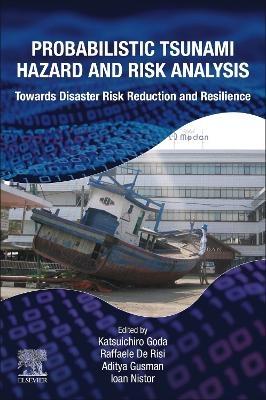
Probabilistic Tsunami Hazard and Risk Analysis
Elsevier - Health Sciences Division (Verlag)
978-0-443-18987-6 (ISBN)
Dr. Katsuichiro Goda is an Associate Professor in the Departments of Earth Sciences and Statistical & Actuarial Sciences and Canada Research Chair in Multi-Hazard Risk Assessment at Western University, Canada. His research focuses on catastrophic multi-hazard risk management from economic and societal viewpoints. He has extensive expertise in developing natural catastrophe models, applying them to insurance risk quantification, and evaluating communities' socioeconomic vulnerability. Dr. Raffaele De Risi is a is a Associate Professor in the School of Civil, Aerospace and Design Engineering at Bristol University, United Kingdom. His research interests are broad and multidisciplinary and cover a wide range of academic fields, including structural reliability, engineering seismology, earthquake engineering, tsunami engineering, and decision-making under uncertainty. He has internationally recognized expertise in developing probabilistic tools for managing risks caused by extreme loads on the built environment. Dr. Aditya Riadi Gusman is a Tsunami Scientist at the GNS Science, New Zealand. He has extensive experience in physical oceanography and the numerical modeling of tsunami generation processes, including those from seismic and non-seismic sources such as submarine landslides and volcanic eruptions. His expertise extends to advanced numerical methods, tsunami sediment transport modeling, and machine learning techniques related to real-time tsunami forecasting and tsunami early warning. Dr. Ioan Nistor is a Professor of Hydraulic and Coastal Engineering in the Department of Civil Engineering at the University of Ottawa, Canada. He is a coastal and hydraulic engineer researching hazards associated with extreme hydrodynamic and debris loading on infrastructure. His research expertise broadly spans from tsunami impact on infrastructure, extreme wave and flood forces on structures, and dam failure phenomena.
1. Introduction of Probabilistic Tsunami Hazard and Risk Analysis - Towards Disaster Risk Reduction and Resilience
Section 1: Fundamentals of Probabilistic Tsunami Hazard and Risk Analysis
2. Tsunami Generation
3. Tsunami Propagation and Runup
4. Tsunami Effects on Built Environment
5. Probabilistic Tsunami Hazard and Risk Assessments
6. Tsunami Disaster Risk Reduction and Management
Section 2: Advanced Topics and Applications related to Probabilistic Tsunami Hazard and Risk Analysis
7. Historical Tsunami Records and Paleo Tsunamis
8. Informing Megathrust Tsunami Source Models with Knowledge of Tectonics and Fault Mechanics
9. Tsunamis Triggered by Splay Faulting
10. Tsunami Hazard from Subaerial Landslides
11. Dense Tsunami Monitoring System
12. Machine Learning Approaches for Tsunami Early Warning
13. Global Tsunami Hazards and Risks
14. Probabilistic Tsunami Hazard Assessment for New Zealand
15. Tsunami Hazard and Risk in the Mediterranean Sea
16. Tsunami Hazard Assessment in Chile
17. Uncertainty in Empirical Tsunami Fragility Curves
18. Analytical Tsunami Fragility Curves
19. Modeling and Uncertainty in Probabilistic Tsunami Hazard and Risk Assessment
20. Multi-hazard Risk Assessments
21. Dynamic Agent-based Evacuation
22. Sea Level Rise and Tsunami Risk
23. Long-term Tsunami Risk Considering Time-dependent Earthquake Hazard and Nonstationary Sea Level Rise
24. Digital Twin Paradigm for Coastal Disaster Risk Reduction and Resilience
Appendix
| Erscheinungsdatum | 19.10.2024 |
|---|---|
| Verlagsort | Philadelphia |
| Sprache | englisch |
| Maße | 216 x 276 mm |
| Gewicht | 450 g |
| Themenwelt | Naturwissenschaften ► Biologie ► Ökologie / Naturschutz |
| Naturwissenschaften ► Geowissenschaften ► Geologie | |
| ISBN-10 | 0-443-18987-0 / 0443189870 |
| ISBN-13 | 978-0-443-18987-6 / 9780443189876 |
| Zustand | Neuware |
| Haben Sie eine Frage zum Produkt? |
aus dem Bereich


